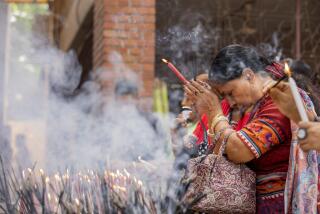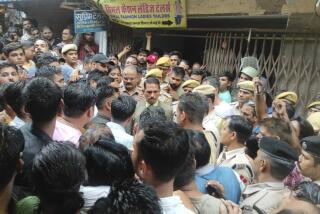As Bangladesh launches crackdown on killings, 62-year-old Hindu man becomes the latest victim
Reporting from Dhaka, Bangladesh â As Bangladeshi police began a week-long offensive against suspected Islamist militants, an elderly Hindu man was hacked to death Friday in the countryâs northwest in the latest killing to be blamed on extremists.
The victim, Nityaranjan Pandey, 62, was attacked while on his morning walk in Pabna district, where he has volunteered at a Hindu ashram for the past 40 years, residents said.
The acting general secretary of the ashram, Sri Jugol Kishore Ghosh, said he could not understand why Pandey was targeted shortly before 7 a.m. outside a mental hospital.
âWe are yet to understand why they killed a person like Pandey who is such a gentle man, but weak from diabetes,â Ghosh said.
Pandey was the fourth person in the past week to be killed in a series of targeted attacks by machete-wielding assailants against religious minorities, secularists, foreigners, gay rights activists and others that began more than a year ago but has accelerated in recent months. Three days earlier, a 69-year-old Hindu priest was hacked to death in the southwestern district of Jhenaidah.
Islamic State said it had carried out that killing, one of many that the militant organization has claimed in recent months. Al Qaedaâs branch in the Indian subcontinent has also claimed several killings, raising the specter of international jihadism in this predominantly Muslim nation of 160 million people.
But Bangladeshâs government has rejected any allegation that international terror groups are active in the country and blamed the attacks on political rivals.
Prime Minister Sheik Hasina told a news conference this week that she had evidence that political parties were behind the killings. While she did not specify names, in the past she and members of her government have blamed the Jamaat-e-Islami, the countryâs leading Islamist party, for carrying out or sponsoring the attacks, which Jamaat has denied.
A day earlier, police announced they would begin a seven-day crackdown against Islamist militants across the country. News reports said police detained several hundred people, including members of Jamaat-e-Islami and its student wing, Islami Chatra Shibir, from various parts of the country.
On Sunday, the wife of a senior police official who had conducted raids against militant groups was killed in the port city of Chittagong. Since then, police have conducted raids and engaged in shootouts with suspected militants, reportedly killing at least nine people.
At least seven of those killed were members of Jamaatul Mujahidin Bangladesh, or JMB, a banned militant group, the independent Bangladesh Pratidin newspaper reported.
Security analysts had warned that attacks could increase during Ramadan, the Muslim holy month that began this week, as militants seek to make a statement.
But as Hasina, the head of the secular Awami League party, has clamped down on free speech in recent months, experts worry that the police crackdown could offer another pretext for her government to target its political opponents, including Jamaat-e-Islami.
Authorities until now have made scant arrests in the killings, saying some suspects have left the country, and appear powerless to stop further attacks.
The official response is increasingly unsettling to Bangladeshâs allies, including the United States, which views the country as an ally against counter-terrorism and has refrained from criticizing Hasinaâs government publicly.
A Christian man was also killed in the northern district of Natore earlier this week.
Binoy Jyoti Kundu, general secretary in Pabna for the Bangladesh Hindu Buddhist Christian Unity Council, a group that advocates for the rights of religious minorities, said the attacks were âa plan to destabilize our country.â Hindus are the largest religious minority in Bangladesh, with slightly less than 9% of the population, according to a 2011 census.
A police official in Pabna, Abdullah al Hassan, said Pandeyâs body was handed over to ashram authorities after a post-mortem.
Special correspondent Khan reported from Dhaka and staff writer Bengali from Mumbai, India.
Follow @SBengali on Twitter for more news from South Asia
More to Read
Sign up for Essential California
The most important California stories and recommendations in your inbox every morning.
You may occasionally receive promotional content from the Los Angeles Times.











